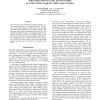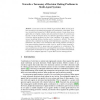8008 search results - page 5 / 1602 » Learning in Multi-Agent Systems |
ATAL
2004
Springer
13 years 10 months ago
2004
Springer
Product Distribution (PD) theory was recently developed as a framework for analyzing and optimizing distributed systems. In this paper we demonstrate its use for adaptive distribu...
KR
2010
Springer
13 years 9 months ago
2010
Springer
We investigate a class of first-order temporal epistemic logics for the specification of multi-agent systems. We consider well-known properties of multi-agent systems including ...
KBSE
2002
IEEE
13 years 10 months ago
2002
IEEE
Engineering individual components of a multi-agent system and their interactions is a complex and error-prone task in urgent need of methods and tools. Prototyping is a valuable t...
ATAL
2004
Springer
13 years 10 months ago
2004
Springer
Product Distribution (PD) theory is a new framework for controlling Multi-Agent Systems (MAS’s). First we review one motivation of PD theory, as the information-theoretic extens...
MATES
2009
Springer
13 years 12 months ago
2009
Springer
Abstract. Taxonomies in the area of Multi-Agent Systems (MAS) classify problems according to the underlying principles and assumptions of the agents’ abilities, rationality and i...


